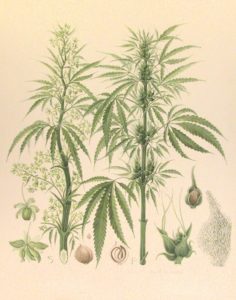“For the past 4,000 years, patients and doctors of each era have resorted to cannabis when conventional treatments were ineffective or lacking. Indeed, in oncology beneficial effects have been reported for cancer-associated anorexia, chemotherapy-induced nausea and vomiting, and palliation…
The only U.S. Food and Drug Administration (FDA)-approved medicinal cannabis products are an oral formulation containing dronabinol (Marinol®)… the synthetic version of delta9-tetrahydrocannabinol (THC), the main pharmacologically active cannabinoid, and capsules containing nabilone, an analog of dronabinol (Cesamet®)…
…many patients claim (subjectively) that a whole or partially purified extract of Cannabis sativa L. offers advantages over a single isolated ingredient…
We anticipated an increased use of medicinal cannabis concurrent with anticancer drugs, and undertook a drug-interaction study to evaluate the effect of concomitant medicinal cannabis on the pharmacokinetics of irinotecan and docetaxel…
Conclusion. Coadministration of medicinal cannabis, as herbal tea, in cancer patients treated with irinotecan or docetaxel does not significantly influence the plasma pharmacokinetics of these drugs. The evaluated variety of medicinal cannabis can be administered concomitantly with both anticancer agents without dose adjustments.”
Full text: http://theoncologist.alphamedpress.org/content/12/3/291.long



